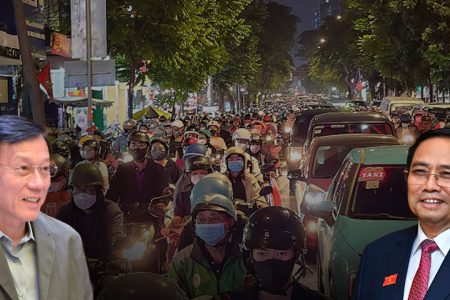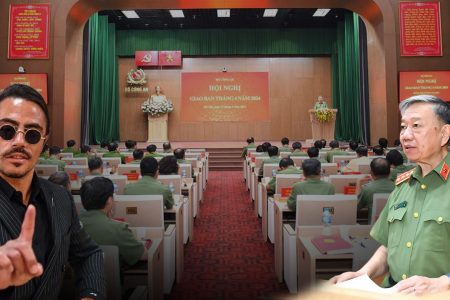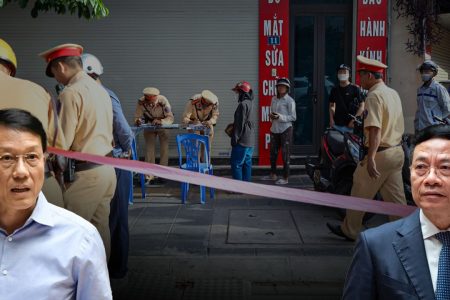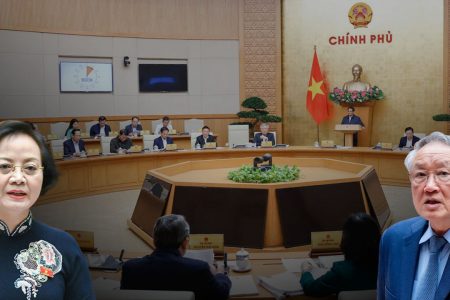
Plan No. 205 of Hanoi is not the first to raise the issue of resignation, this policy has been issued by the Politburo of Vietnam since October 2, 2009, with Regulation 260, then replaced by Regulation No. 41-QD/TW on the dismissal and resignation of officials on November 3, 2021.
In Vietnam today, most officials do not voluntarily resign, so when there is a violation that is brought to trial, there will be dismissal.
Resignation is voluntary, so why should Hanoi have a directive on resignation? Talking to RFA on August 3, Assoc. Dr. Hoang Dung, a cultural and linguistic researcher at Ho Chi Minh City University of Education, commented:
“If you say that, you already see a word error, but the problem is not just a word error. Everyone makes mistakes, but why do people make them? It can be said that in Vietnam when a person has a position of authority, he or she has an accompanying benefit. Therefore, few people resign, and if they do, there are actually many obligations. For example, if they are party members, the Party must agree, all of which makes it difficult to resign, because it is not only dependent on personal will. So it’s linguistically wrong for them to say to resign, but if you understand what people mean, it means accepting someone’s resignation. It shows that resigning depends on many other factors, in Vietnam, it is so difficult that one has to issue such an instruction.”
Resignation culture, in other words, is a culture of behavior based on conscience, when a leader feels that he or she has shortcomings, or is no longer worthy to assume a leadership position, they will resign. This shows an understanding of the duties, and responsibilities, of the position holder.
Regarding how to build a culture of resignation among Vietnamese cadres, Assoc. Dr. Hoang Dung says:
“The first thing must be done so that the actual income and actual interests of the person holding the position and the person who then does not hold the position are not too different. If that’s the case, then people can still live when they resign, if they don’t have a position they can live fully, but if they don’t, it’s extremely hard. I speak in reality, not just in name, because if you look at the payroll, it is never big, so it makes it difficult for people with previous positions to resign.”
According to Assoc. Dr. Hoang Dung, building a resignation culture must start by reorganizing how to use people or manage society. Rather than simply calling out like a personal moral issue, because this is a social issue.
As for journalist Vo Van Tao, when responding to RFA from Nha Trang regarding this issue, it is very rare for cadres of the Communist Party of Vietnam, in the State apparatus, to announce their resignation.
“In addition to the previous event, in which a secretary of Dong Nai stated that if Dong Nai people were hungry, he would resign. In fact, there was a case a few years ago, Mr. Doan Ngoc Hai Deputy Chairman of District 1 People’s Committee also resigned. But going back a little bit, I see cases like Mr. Le Huy Ngo, former Minister of Agriculture, who also announced his resignation a decade ago when the case of La Thi Kim Oanh and her corrupt associates happened. But in general, the phenomenon of resignation in Vietnam is very, very rare.”
Former Minister of Agriculture and Rural Development Le Huy Ngo submitted his resignation in May 2004, when he once said: ‘Resignation should be considered a normal thing, a civilized feature in political life.”
According to journalist Vo Van Tao, Vietnam has different characteristics from other countries, that is, the leadership and governance of the country depend on the top collective of the Communist Party of Vietnam. Mr. Tao continued:
“Some people have self-esteem, when they can’t do their job, they quit and resign… but they are most afraid of being judged by the Party for not complying with the Party’s resolutions… that will become a black mark in their CV, but sometimes even infect their children later, backgrounds in Vietnam is very heavy. So because of that long-standing habit, from the time the Communist Party was established until now, the phenomenon of resignation, possibly due to ability, honor… is rare.”
Historian Duong Trung Quoc, a former member of the National Assembly with many terms from 2002 to 2021, when answering RFA from Hanoi in the past, said that “resigning” looks voluntary on the surface, but in essence is almost a compulsion. Because, according to him, the most important thing that Vietnam does not have is the lack of a social value system. Mr. Duong Trung Quoc recounted the story of the old mandarins, who had great integrity, just for family reasons, or burdens, people measured their strength and would resign, this was based on an old educational foundation. He said:
“In other words, it is the pressure of society, the pressure of those values, that people accept to resign. Everyone knows that resigning is giving up power, giving up even benefits. But when they choose between those two values in the social value scale, they find it better to resign. And that resignation also has a social value for people to share, even respect. But clearly, that’s not true in modern society.”
Mr. Duong Trung Quoc added that in other countries, it is customary to resign because there is also great social pressure. Even insiders can’t survive because there will be other mechanisms, that force them to resign. However, in the opposite direction, sometimes it is not possible to want to resign:
“Officials are attached to power and interests, which are not personal interests, sometimes what we call group interests, the interests of a group of people. And when you want to resign, you can’t resign, because it’s binding. So I think it’s important now to come up with a social value, but a social value through public opinion and social education.”
According to Mr. Duong Trung, the most important thing is the consciousness of Vietnamese officials, they must pay attention to public opinion. In other words, according to him, it is the standard of seriousness that should be in every person, especially the more senior officials, the more they need to have that standard.
Thoibao.de (Translated)




























